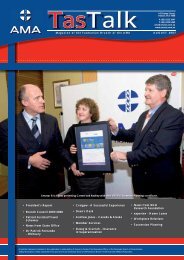This issue - AMA Tasmania
This issue - AMA Tasmania
This issue - AMA Tasmania
You also want an ePaper? Increase the reach of your titles
YUMPU automatically turns print PDFs into web optimized ePapers that Google loves.
Imagine being forced to close your business<br />
Jane Wilson<br />
Loss of trade, wages in lieu of notice, ongoing<br />
payment of fixed expenses, relocation to<br />
alternative premises, advertising costs<br />
associated with relocation. These are just<br />
a few of the obstacles you would need to<br />
overcome if you were forced to close your<br />
business due to unexpected circumstances<br />
such as a fire or storm damage.<br />
It can happen to anyone<br />
Christmas is usually the peak trading period,<br />
but that wasn’t the case for a Melbourne<br />
pharmacy when it was forced to close its<br />
doors a few weeks before Christmas. Situated<br />
in Station Street, Fairfield, the building and<br />
contents sustained severe water damage after<br />
a large truck drove past the pharmacy and<br />
pushed a “bow wave” of accumulated storm<br />
water into the shop. The main street had been<br />
completely flooded after heavy storms caused<br />
the drains to overflow.<br />
The extensive water damage meant that<br />
the building had to be completely gutted<br />
and contents removed. Only a year earlier<br />
the shop had undergone a total refit so the<br />
existing plans were able to be used to repair<br />
the interior structure. Although the owners<br />
missed out on all of the increased trade over<br />
the Christmas period trading resumed six<br />
weeks after disaster struck.<br />
How vulnerable is your business and how would<br />
you survive financially if you suffered a total<br />
loss due to fire or water damage? Would you<br />
run the risk of losing your clientele to a nearby<br />
competitor?<br />
In the case above, the indemnity period<br />
applying to the Business Interruption cover<br />
was sufficient to safeguard the ongoing<br />
viability of the business. But in some instances<br />
the indemnity period can expire before the<br />
business income returns to its pre loss position<br />
as was the case for the pharmacy owned by<br />
Martin Neumeyer at Dodges Ferry, near<br />
Hobart.<br />
Martin’s selected indemnity<br />
period wasn’t sufficient ...<br />
Picture a small shopping centre with six<br />
shops. Mr Neumeyer’s pharmacy was one of<br />
four shops totally gutted by fire in July 2005.<br />
Unfortunately the fire started in the adjacent<br />
second-hand goods store which was not fitted<br />
with wired-in smoke detectors. Early detection<br />
14 TA S T a l k A P R I L 2 0 0 7<br />
often minimises the amount of damage<br />
sustained, but in this incident the fire spread<br />
quickly to the surrounding premises.<br />
Mr Neumeyer’s12 month indemnity period<br />
expired on 6th July 2006 and, regrettably, on<br />
this occasion the 12 month indemnity period<br />
provided by the policy didn’t allow sufficient<br />
time for the premises to be rebuilt.<br />
Why? The process of rebuilding was beyond<br />
the control of Mr Neumeyer. Rebuilding was<br />
repeatedly delayed during the intervening 12<br />
months. Builders in the area were in short<br />
supply. Everyone knows that most builders are<br />
generally overcommitted to multiple jobs at<br />
once. <strong>This</strong> was the case for this project.<br />
Through no fault of Mr Neumeyer or his<br />
insurer, this meant that his selected indemnity<br />
period fell short of the period required for<br />
the landlord to reinstate the buildings and<br />
ultimately allow the business’ income to return<br />
to pre fire levels.<br />
... and the pharmacy<br />
couldn’t be relocated<br />
No premises were vacant for lease in the<br />
immediate locality so the pharmacy couldn’t<br />
be relocated to resume normal trading.<br />
Temporary walls had to be constructed within<br />
the shell of the burnt out building, which<br />
reduced the floor area considerably. Lack of<br />
floor space meant there were no consulting<br />
areas, no proper departments or signage. Mr<br />
Neumeyer had to dramatically reduce the<br />
amount of stock available, which also lowered<br />
takings.<br />
Apart from the obvious inconveniences, a<br />
significant challenge was being forced to<br />
conduct business in a temporary structure<br />
within an existing premises. Regular customers<br />
- especially the elderly - were bothered by<br />
the makeshift operating conditions and were<br />
inconvenienced by not being able to use a<br />
consulting area when having prescriptions filled<br />
or seeking advice. As with many businesses,<br />
pharmacies rely on their location and repeat<br />
customers, both of which can be jeopardised<br />
if disaster strikes.<br />
Picking up the pieces<br />
The challenges outlined in these loss situations<br />
are encountered in every major claim. In<br />
extremely stressful circumstances, business<br />
owners often have to spend considerable<br />
time saving their business, project managing<br />
the reconstruction or repair of their destroyed<br />
or damaged property, and then manage their<br />
insurance claim. They must continue to pay<br />
fixed expenses (interest payments on loans,<br />
lease payments on property, equipment or<br />
vehicles, wages to key employees, rates, phone<br />
bills, etc.) even if their income stream has been<br />
temporarily interrupted or halted.<br />
A quick survival checklist<br />
After reading about these case studies, ask<br />
yourself these questions. If you were faced<br />
with a significant or total loss situation, i.e. fire:<br />
• How quickly could you re-establish your<br />
business in a nearby location?<br />
• Would you be able to find another premises<br />
easily accessible by your customers?<br />
• How long would it take to fully regain a<br />
level of trading experienced prior to the<br />
loss?<br />
• How quickly could you replace the<br />
specialised equipment required to operate<br />
your business?<br />
How to prevent this<br />
happening to you<br />
Before any loss occurs it is vitally important<br />
for you to have the right type of insurance<br />
protection to suit your needs. It is essential<br />
for you to provide accurate income and gross<br />
profit figures and allow for any anticipated<br />
growth trends when you take out business<br />
interruption cover. Additionally, give serious<br />
consideration to selecting an appropriate<br />
indemnity period that suits your specific<br />
circumstances - the length of time you choose<br />
could make or break your business.<br />
Guild can provide expert advice on business<br />
insurance that is tailored specifically to meet<br />
your individual needs. Make sure your business<br />
will survive if you are forced to temporarily<br />
close your doors. Contact Guild today on 1800<br />
810 213 because, when the worst happens,<br />
we’re the best there is.<br />
Guild Insurance Limited AFSL No 233791




